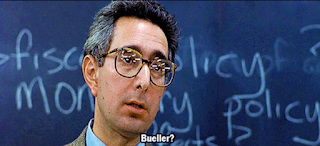As I get ready to start my school year, I found myself reflecting on some of the skills and strategies that lead to a strong start. Now, as you read them I know you'll think that since I'm writing it, I must be great at these skills. Hardly. These are the ones that I know are important for both short and long term success in a year, but many of them are ones I struggle with enacting.
Now this list is in no way fully comprehensive. There are many thoughts I had that would be important, but for me these are the ones I need to remember to put into practice. These are presented in no particular order.... except this one:
LEARN YOUR STUDENT'S NAMES.
Nothing on this list can help you have a more successful start and finish to a year than this. You will be asking your students to get out of their comfort zone on a very regular basis. They need to trust they will be safe. Nothing breaks that trust more than saying "hey... um... you." There are many layers to emotional safety, but none are higher than you knowing that child's name. "Hey you, the volleyball player that likes MCR" is really not as effective as "Hey, Sasha! What was the name of the band you were talking about last week?"
Practice their names. Say them correctly; ask if you are unsure. Don't give them a nickname because "the name is too hard to say" or "too tricky to remember." Challenge them to quiz you in the halls and at lunch. Give them a high five when you get it right. Give them a high five when they have to correct you.
Learn. Their. Names.
Establish procedures and protocols in your classroom.
If you have particular ways to hand in work, check in assignments, enter the room, or ask to use the restroom, make sure they know them. Practice these in detail the first few days. Explain them as expectations, not as discussion points. If the procedure is important to you, stop class when it isn't followed.
Contact your families
As early as you can in the year, contact the families of all of your students. Call, e-mail, send a letter home. Whatever works best for your situation. Let them know how happy you are that their child is in your room. Let them know how well they are adjusting to their new grade/classroom/school. Invite them to contact you should they have questions or concerns. That one call or e-mail makes trickier conversations later in the year go much easier.
Schedule you time
The school year is a marathon, not a sprint. You need aid stations to get through it. Whether time is spent reading (for pleasure, not professional development), hanging out with friends (and not talking about lessons or students), blogging (about things other than work), Netflix... whatever. Find time for non-work-anything activities. No e-mail, updating grade books, looking at student work, or focusing on lessons. Schedule 'you time' on your google calendar. Make it sacrosanct.
Be kind to yourself
Give yourself some grace. We preach to students that mistakes are expected. We tell them it's ok to misunderstand directions. We encourage them to push their limit knowing they'll fall along the way. We tell them "you're just doing this for the first time, of course you'll make a mistake!" Well, this is the first time you're teaching this curriculum to these specific students. If it is ok for them to make mistakes, it's ok for you to make mistakes as well.
Reflect
But focus on the positives. Ask yourself, "What went well about my day?" before you get into, "what would I have changed?" SO often as educators we focus on the one group that didn't get the concept, the one student that caused a disruption, or the one part of the lesson that bombed. Start with positives. Then, anytime you reflect on a negative say, "yup, but (this) and (this) went well."
There are many many more thoughts on my mind that could be on this list. I'm curious what would you add? Leave a comment below about something that I missed that is on your essentials list!


No comments:
Post a Comment